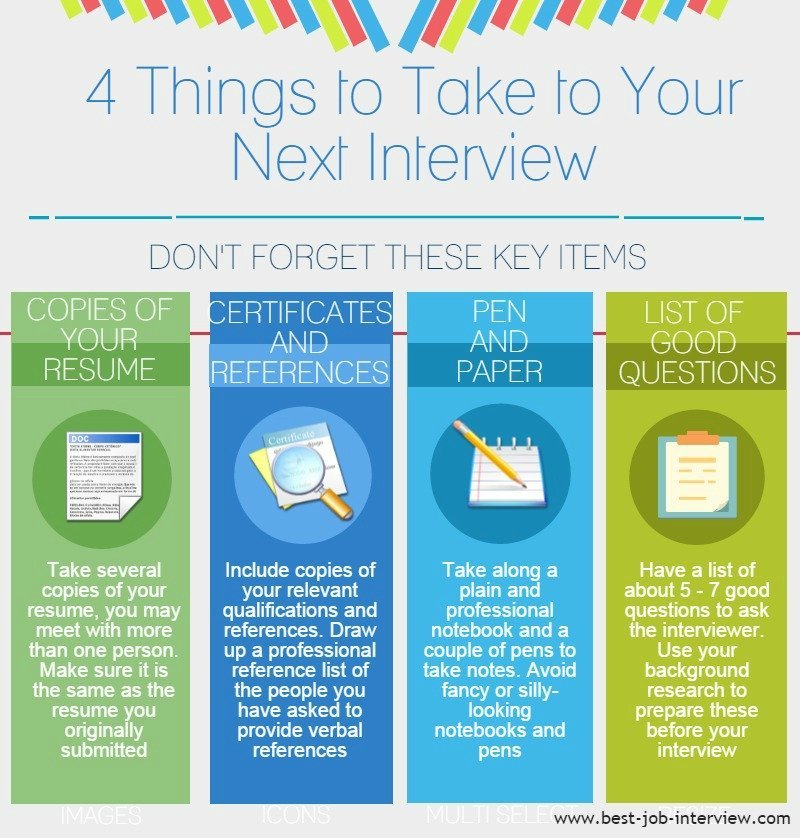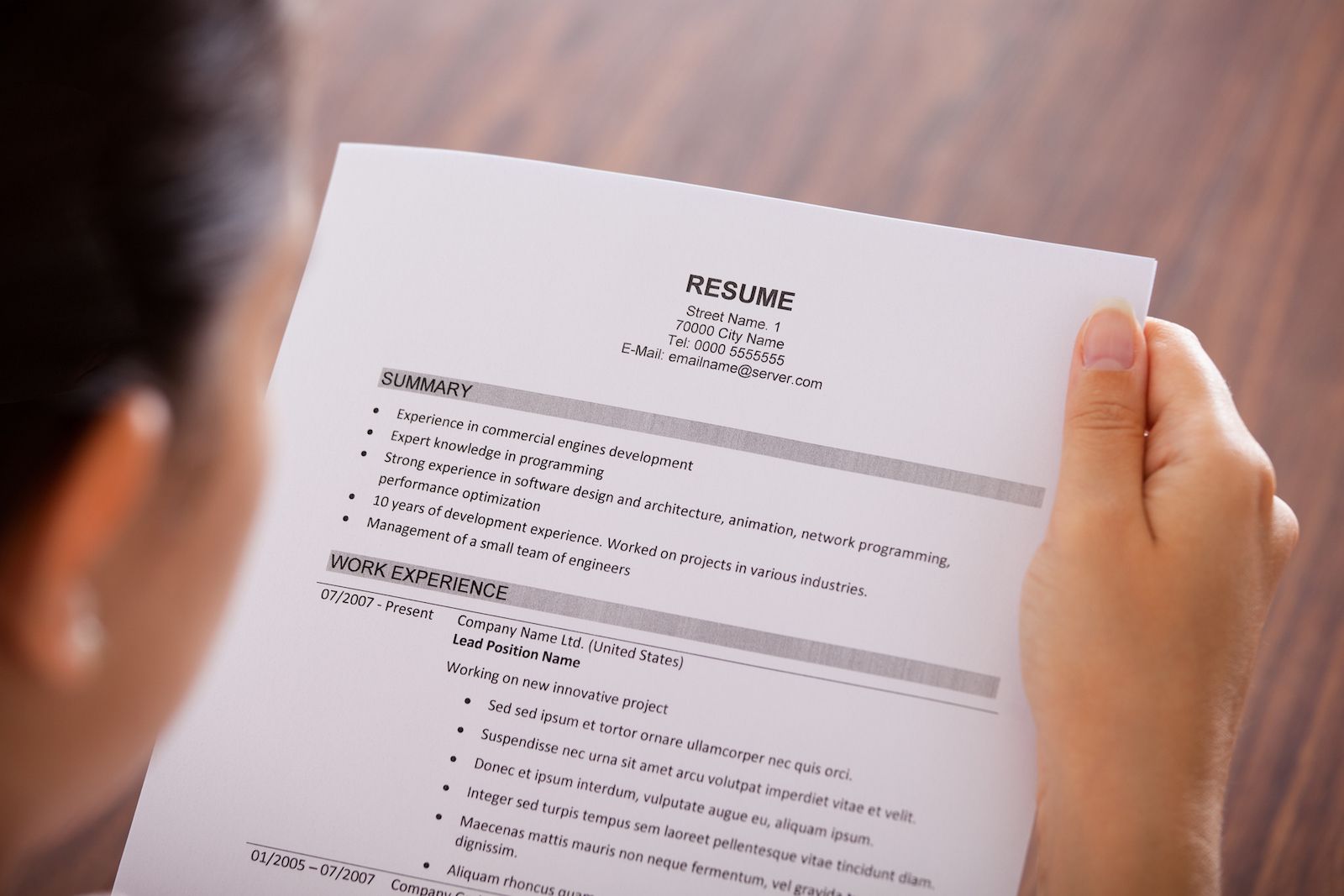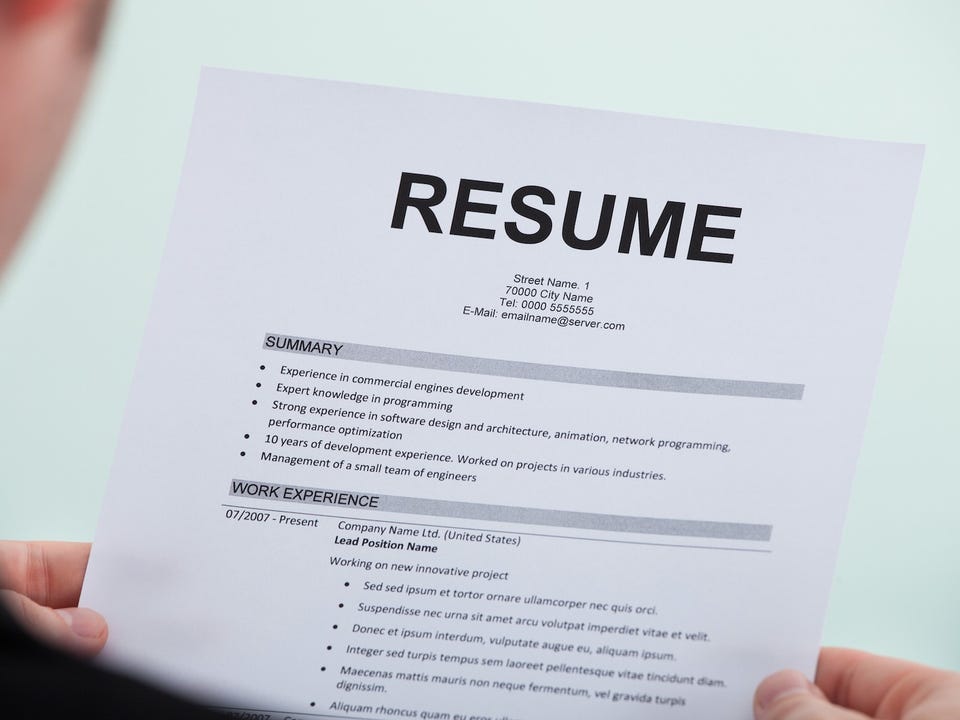Prepare Answers To Unexpected Questions
Review the most commonly asked job interview questions and take a few minutes to consider what your interviewer might ask. Your interviewer may ask questions that are specific to your work history or ask for clarification for items you put on your resume. For example, if you included information on your resume that indicated that you were proficient in a foreign language, your interviewer might test you and ask you a question in that language. Be prepared to defend your resume and give your interviewer interesting information they might not already know.
When Should You Avoid Bringing Notes To An Interview
Bringing notes with you to an interview can also be inappropriate in certain situations. For instance, if you have a list of all the answers you plan to address the interviewer’s questions with, it can be a good idea to leave those at home. Relying too heavily on notes like these can actually make you seem unprepared and that you haven’t researched the job details or the company. There are several other situations where it can be inappropriate to bring notes with you to an interview, and some scenarios include:
- Relying on notes to answer interview questions
- Using notes in a behavioral interview
- Bringing notes to a situational interview
- Using notes taken on your cellphone
A Pen/pencil And A Notepad
Your notepad serves a dual purpose. First, you will need to write down notes before the interview, which include talking points and questions you want to ask. Secondly, you will likely want to take notes during the interview. The best time to takes notes is when you are asking questions near the end of the interview. Until then, maintain good eye contact with the interviewer.
Read Also: Professional Resume Picture
Should I Bring My Resume To An Interview
A strong resume is typically the first stage in applying for a job, but it can also support you during the rest of the hiring process. There are several items that are important for you to bring to an interview, including your resume. Understanding whether to bring your resume to an interview can help you feel more confident and prepared when going in to the meeting. In this article, discuss the answer to the question “Should I bring my resume to an interview?”, explore other items you can bring to your job interview, and provide tips to help you prepare.
The Importance Of Preparing Questions For Your Interviewers

Preparing several questions to ask the interviewer is imperative. It shows that youve done your research, provides evidence of your interest in the position, and illustrates that you have spent time thinking about how your skills and personality will fit with the company.
For more information about interview questions check out The Interview Guys previous blog article Top 14 Questions To Ask In An Interview.
Recommended Reading: Language Skill Level Resume
Several Copies Of Your Resume
You most likely already submitted your resume when you applied for the job, but dont assume the interviewer will have a copy of it on hand. Hiring managers get busy and sometimes forget to print out your resume, DeWall says.
Why bring multiple copies? You never know how many employees youre going to be meeting with, says Rachel Loock, a career coach at the University of Maryland. Its rare you only meet with .
Did You Bring Your Resume
There are some interview questions that tip the scales between tough to answer and impossible to answer. There are some questions that are so hard, that as soon as you are asked the question, you know you dont have the job. There are some questions that merely hearing the sentence can cause you to hyperventilate. There are some questions that are so unthinkably unanswerable, you may as well walk out of the room without so much as a goodbye.
This is not one of them.
The reason we are bringing up this question is because of some common hiring manager advice on what you should do with your resume when you bring it to the employer. Rather than hand it out right away, you should wait until prompted. They may already have a copy of your resume on hand, and you do not want to force extra paperwork in their face that they dont need. So if you are asked if you brought your resume, do not hand it out. Ask them if they want a copy, and if they would like any additional copies for other staff.
You May Like: Good Wpm For Resume
Contact Information And Directions
While there are many things you can control during the interview, getting there is not one of them and traffic or public transport can easily let you down. Plan ahead how you will get there and make sure you have the contact details of the person you are meeting in case you need to contact them for anything.
Have directions to where you are going before hand and if you can, find your way there before the interview, so you know exactly where you are going.
Focus On Your Accomplishments And Skills
Rather than a simple rendition of your position, titles, and responsibilities, cite your key accomplishments and reference the skills that enabled you to achieve those successes. Be sure to mention how you impacted the bottom line in those roles, and how you added value to your employer.
Did you help the company save money or work on a team that finished a major project? Be ready to explain these achievements in a succinct but interesting manner. Try to present your points in the form of stories that portray problems you solved and challenges you met.
This part of the job interview is also a great opportunity to explain job movement as it relates to your career.
For instance, you might say, “Working at ABC Company taught me a great deal about product marketing, but I ultimately made the move to XYZ Company because it offered me the opportunity to manage a team. Working in this kind of leadership and team-building environment is a real priority for me.”
Also Check: How To Use Resume Template In Word 2010
Assembling And Presenting Your Resume
Highlight How You’re A Match
Rather than summarizing whats on your resume, consider your response an opportunity to highlight the aspects of your resume that show that you’re a great match for the role.
Use the time to tell the interviewer about your related achievements and what you accomplished at each position youve held. Heres how.
Recommended Reading: Is It Ok For A Resume To Be 2 Pages
What Should I Put My Resume In When Going On Interviews
It’s crucial to come to an interview well prepared. Of course, that means preparing answers to predictable questions, and dressing so that you look the part. But preparation also means bringing the correct documentation. You’ll instantly come across as a professional if you bring additional copies of your resume and recommendation letters.
How Do You Describe A Beautiful Woman

This entry should be the ultimate guide to describing a beautiful woman.She had a shapely figure. FIGURE.It was imp-thin. BODY.She was wasp-waisted. WAIST.She had glossy skin. COMPLEXION.She had slender eyebrows. EYEBROWS.Her eyelashes were velvety. EYELASHES.She had sea-nymph ears. EARS.She had a dainty nose. NOSE.
Don’t Miss: How To Put Resume On Indeed
How Many Copies Of My Resume Should I Bring To A Job Interview
It goes without saying that if youre going to a job interview, you should bring a few copies of your resume. This raises the question though, how many? You dont want to seem wasteful and bring too many. You also dont want to have too few if a hiring manager needs a copy. Figuring out the right number of copies isnt quite as important as doing research on the company. However, not having enough copies to hand out in a job interview can lose you some points. Today well outline how you can gauge what the magic number of copies will be.
What Not To Bring To A Job Interview
Perhaps even more important than knowing what to bring to a job interview, is of course, what NOT to bring to a job interview.
Now you may laugh at some of these items, but trust me, they have all been brought to job interviews by real people and in 99.9% of those cases, they left the interview without job offer for this exact reason.
So, be sure not to bring these items to your next job interview:
You May Like: How To Make Resume In Google Docs
Be Prepared Even If Theyre Not
In an ideal world, every hiring manager would go prepared to the interview and have a copy of your resume in front of them. Making this assumption is dangerous, and you shouldnt rely on the hiring manager bringing a copy. If they dont, and then ask you, you should be prepared to accommodate. Well discuss a few potential situations, and what would be most appropriate for each one.
Well start with the easiest scenario. Lets say, youve only been working with one hiring manager/interviewer, and they have informed you that you will be meeting one on one. In this case, you know that you will only be meeting with one person. This makes it easy to prepare. If youve read our blog about what you absolutely need to bring to an interview, you know that having a portfolio is crucial. What is great about a portfolio, is one side acts as a notepad, and the other as a folder. The pocket side is a great place to keep those resume copies. If you are meeting with a singular hiring manager, you should bring at least 4 5 copies. This may seem like overkill, keeping them in a portfolio makes it easy to bring them along.
Does Resume Matter After Interview
If you dont have confidence in your skills and if youre unable to showcase your qualifications, writing a resume can be quite a challenge. Your resume in the interview isnt nearly as important as our interview performance itself.
Does resume matter?
Yes, they do matter. But nowhere near as much as you think or as much as professional resume writers will tell you. Resumes are important in helping you think through your experience and how to present yourself. If you are referred to a hiring manager, the referral means much more than whats on your resume.
You May Like: Related Courses Resume
What Not To Bring Or Do
Doing the following will likely ruin your chances of getting the job:
- Dont carry in your morning coffee or protein shake.
- Don’t bring your parent or anyone else with you.
- Dont arrive talking on a cell phone or texting. Turn off your phone before you enter the building and store it in a handbag or briefcase.
- Dont wear a hat or cap leave it at home.
- Dont chew gum or suck candy.
- Dont overwhelm the interviewer with your piercings or tattoos. If you have a lot of piercings or earrings, remove them, so they arent a distraction. One pair of earrings, such as small studs or hoops, is acceptable. Do your best to cover your tattoos.
- Dont wear strong perfume or cologne you never know if someone is allergic in the office.
- Don’t wear leisure clothes such as jeans, workout wear, sneakers, or flip flops. Wear a pants or dress suit and close-toed shoes.
- Don’t appear with messy, unwashed hair. Make sure your hair is clean and off of your face.
What Not To Bring To An Interview
Once youre prepared with all of the interview must-haves, double check to make sure youre not heading into the meeting with these things in tow:
- A phone with the ringer left on
- Earbuds
- Your carryout lunch
- A suitcase
- A waft of heavy perfume or worse, cigarette smoke
- Salary demands
- A negative attitude
One final thought: If you absolutely must swing through the supermarket on your way to an interview? When youre invited to tuck the bag in the coat closet, strongly consider responding with a yes. Or better yet, just hit the store after.
Read Also: Do You Put Gpa On Resume
Using Notes In A Situational Interview
The purpose of situational interviewing is to see how job candidates might solve a problem with little to no preparation. This can help interviewers gauge candidates’ analytical and problem-solving skills, and bringing notes that give you answers to these scenario questions can take away from showing off your ability to provide a solution under pressure. Succeeding in this type of interview can depend on how well-prepared you are, however, relying on notes to get you through the interview can take away from highlighting how you make quick decisions.
Lists Of Your References

Your interviewer might ask you for references, so bring copies of your list. Appropriate references can be co-workers, teachers, community leaders, managers and anyone who has worked with you in an academic, professional or nonprofit setting. Also, remember that you should ask your references before creating the list because you will need to include their contact information.
You May Like: How To Write Volunteer In Resume
Know What To Bring To A Job Interview And What To Leave Behind
The most qualified candidate isnt always the one that gets the job. Even if youre less qualified for a position than others, being prepared can set you apart. If you bring the right items and leave the wrong ones behind, the interviewer is more likely to view you as a desirable candidate.
They may even choose you over someone with more experience and better credentials. All you have to do is prove that youre a sharp, well-prepared candidate with potential.
Some candidates come into an interview overconfident because they believe their previous job titles will blow the interviewer away, said Clay Burnett, executive recruiter at Clay Burnett Group.
Be prepared for your interview and act like you have to prove yourself to get the job, even if you know youre a shoo-in.
Is A Cover Letter Necessary For A Resume At An Interview
Cover letters aren’t always required if you want to be considered for a job. However, in any circumstance, it’s good to compose one if only to show that you’re keenly aware of the proper way to submit your qualifications to a prospective employer. While your cover letter isn’t necessary at an interview, take it with you anyway. If you didn’t compose a cover letter when you applied for the job, create one and take it with you to the interview. It might come in handy for any number of reasons.
Also Check: How To List Courses On Resume
Discussing Your Resume During The Interview